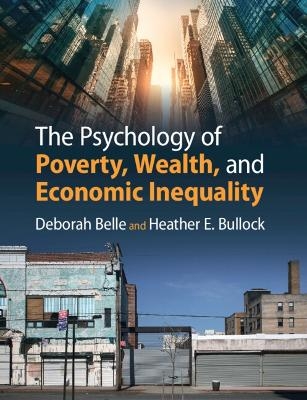
The Psychology of Poverty, Wealth, and Economic Inequality
Cambridge University Press (Verlag)
978-1-108-73182-9 (ISBN)
Economic inequality is a defining issue of our time, with a handful of individuals in the United States today owning more wealth than half the population in the country. What are the psychological consequences of living in a profoundly unequal society? This comprehensive textbook is among the first to examine poverty, wealth, and economic inequality from a psychological perspective. Written by two leading scholars in the field, it provides an intersectional analysis of the impact of economic inequality on cognitive, emotional, interpersonal, intergroup, physiological, and health outcomes. Students are introduced to the diverse methods used to study poverty, wealth, and economic inequality and the strengths and weaknesses of various approaches, while the text focuses on solutions at the individual, community, and national levels to restore optimism and encourage action. Chapter features include exercises and reflection questions that help students think critically about the implications of research findings for their own lives.
Deborah Belle is Professor Emerita of Psychological and Brain Sciences at Boston University. Her books include Lives in stress: Women and depression; Children's social networks and social support; and The after-school lives of children: Alone and with others while parents work. She has been a William T. Grant Foundation Faculty Scholar in the Mental Health of Children; Evelyn Green Davis Fellow in Psychology at the Bunting Institute, Radcliffe College; and Fellow of the Radcliffe Public Policy Institute. She is a Fellow of the American Psychological Association and of the Society for the Psychological Study of Social Issues. Heather E. Bullock is Professor of Psychology and Director of the Blum Center on Poverty, Social Enterprise, and Participatory Governance at the University of California, Santa Cruz. Her most recent book is Poorly Understood: What America Gets Wrong about Poverty (with Mark Robert Rank and Lawrence M. Eppard). She received a 2019 American Psychological Association Presidential Citation for her contributions to the field of psychology related to social psychological dimensions of poverty and economic (in)justice. Before joining UCSC's faculty, she served as an APA/AAAS Congressional Fellow with the U.S. Senate Committee on Health, Education, Labor, and Pensions – Democratic Office.
1. Contemporary Economic Inequalities; 2. Beliefs about social class, poverty, and wealth; 3. Classist stigma, exclusion, and disrespect; 4. Poverty and its Costs; 5. Working Class: The Essential Workers; 6. Wealth and its Costs; 7. Societal Economic Inequality; 8. Race and Racism; 9. Gender and poverty; 10. Housing Precarity and Homelessness; 11. Parenting While Poor; 12. Social Networks and Social Supports; 13. Poverty, Psychology, and Mental Health Services; 14. Working Toward Equality and Economic Justice.
| Erscheinungsdatum | 19.12.2022 |
|---|---|
| Zusatzinfo | Worked examples or Exercises |
| Verlagsort | Cambridge |
| Sprache | englisch |
| Maße | 188 x 247 mm |
| Gewicht | 800 g |
| Themenwelt | Geisteswissenschaften ► Psychologie ► Sozialpsychologie |
| Sozialwissenschaften ► Soziologie ► Makrosoziologie | |
| ISBN-10 | 1-108-73182-1 / 1108731821 |
| ISBN-13 | 978-1-108-73182-9 / 9781108731829 |
| Zustand | Neuware |
| Informationen gemäß Produktsicherheitsverordnung (GPSR) | |
| Haben Sie eine Frage zum Produkt? |
aus dem Bereich


